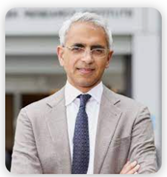
Co-Chair Bios
Ravi Thadhani, MD, MPH
Co-Chair, Blue Ridge Academic Health Group
Executive Vice President for Health Affairs, Emory University
Executive Director, Woodruff Health Sciences Center
Vice Chair, Emory Healthcare Board of Directors
Ravi Thadhani, MD, MPH, is the executive vice president for health affairs (EVPHA) of Emory University, executive director of Emory's Woodruff Health Sciences Center (WHSC), and vice chair of the Emory Healthcare Board of Directors.
As EVPHA and executive director of the WHSC, Thadhani oversees Emory's renowned academic health sciences enterprise focused on advancing research, training, and health care delivery innovation. The Woodruff Health Sciences Center includes Emory's schools of medicine, public health, and nursing; Winship Cancer Institute; Emory National Primate Research Center; Emory Global Health Institute; Goizueta Institute @ Emory Brain Health; Emory Global Diabetes Research Center; and Emory Healthcare.
As vice chair of the Emory Healthcare board, Thadhani provides oversight of Emory Healthcare's CEO and leadership team, ensuring the delivery of high-quality, patient-centered care focused on supporting the health and well-being of patients around the state. Emory Healthcare, with more than 24,000 employees, 11 hospital campuses, and 425 locations, is the most comprehensive academic health system in Georgia.
Thadhani most recently served as chief academic officer and dean for faculty affairs for Mass General Brigham and professor of medicine at Harvard Medical School, both in Boston, Massachusetts. At Mass General Brigham, he was a member of the executive leadership team and oversaw graduate medical education, professional development, and a $2.3 billion research enterprise. Previously, Thadhani served as vice dean of research and graduate research education at Cedars-Sinai Medical Center in Los Angeles (2017-2019), associate director of research at Mass General Brigham (2012-2017), and chief of nephrology at Massachusetts General Hospital (2013-2017).
With more than 30 years as a general and specialized internal medicine physician, Thadhani has extensive experience in patient care, research, and clinical trials. He has led a successful research lab with continuous federal funding for more than 25 years, with a focus on kidney disease and developing diagnostics and therapeutics for patients with preeclampsia. Thadhani has performed several clinical trials focused on effective treatments and preventative measures for preeclampsia, one of the leading causes of maternal and perinatal morbidity and mortality.
He is the author or co-author of more than 300 scientific manuscripts and has published in top-tier journals, including the New England Journal of Medicine, Lancet, and Journal of the American Medical Association. Thadhani has been inducted into several honor societies, including the American Society for Clinical Investigation, Association of American Physicians, American Epidemiological Society, and the American Clinical and Climatological Association. He also serves as a board member of the Broad Institute of MIT and Harvard, a research organization that convenes a community of researchers from across many disciplines and partner institutions - MIT, Harvard, and Harvard-affiliated hospitals.
A recipient of several distinguished national awards, Thadhani has an extensive track record of recruiting and mentoring women and underrepresented staff, trainees, and faculty. He has been honored with the Harold Amos Faculty Diversity Award from Harvard Medical School, the Alumni Award of Merit from the Harvard T.H. Chan School of Public Health, and the John P. Peters Award from the American Society of Nephrology.
Thadhani earned his doctor of medicine degree from the University of Pennsylvania School of Medicine in 1991, his master of public health degree from the Havard T.H. Chan School of Public Health, and his bachelor's degree from the University of Notre Dame. He also completed the LEAD Innovation Certificate Program in 2020 at the Stanford University Graduate School of Business.
John M. Carethers, MD, MACP, FAACR
Co-Chair, Blue Ridge Academic Health Group
Vice Chancellor for Health Sciences
University of California San Diego
Dr. John M. Carethers is vice chancellor for health sciences at University of California San Diego. In this role, he leads the School of Medicine, Skaggs School of Pharmacy and Pharmaceutical Sciences, Herbert Wertheim School of Public Health and Human Longevity Sciences, and UC San Diego Health.
As vice chancellor, Dr. Carethers drives the overarching strategy for all health sciences, working with the chancellor, campus, and health system leadership on expanding UC San Diego's Health's clinical enterprise, fostering research collaborations, enhancing educational opportunities, and expanding philanthropic participation. His collaborative approach, deep expertise, and leadership continue to expand and diversify the global prestige and distinction of University of California San Diego's health sciences.
A distinguished physician scientist and leader in the field of gastroenterological research and treatment, Dr. Carethers' clinical and research interests include familial colon cancer syndroms, mechanisms of tumor progression, DNA mismatch repair, and colorectal cancer disparities.
Dr. Carethers joined UC San Diego in 2023 after a 13-year tenure at the University of Michigan, where he served as the C. Richard Boland Distinguished University Professor and the John G. Searle Professor and Chair of the Department of Internal Medicine.
Prior to that, Dr. Carethers spent nearly 15 years at UC San Diego School of Medicine, including serving as chief of the Division of Gastroenterology. One of his many accomplishments as division chief was securing the inaugural National Institutes of Health-funded Gastroenterology Center grant that allowed the division to grow scientifically and partner with other local institutions, such as the La Jolla Institute for Immunology, Scripps Research Institute, and Sanford Burnham Prebys.
Dr. Carethers earned his medical degree from Wayne State University School of Medicine in 1989, completed his residency in Internal Medicine at Massachusetts General Hospital in 1992 and his gastroenterology fellowship at University of Michigan in 1995.
On the national scene, Dr. Carethers has served as the president for both the Association of American Physicians and the American Gastroenterological Association. He served as chair of the Minorities in Research Council of the American Association for Cancer Research (AACR), developed and co-chaired the programming for the eighth and 10th Science of Cancer Health Disparities conferences, and commenced and contributed to the inaugural (2020) and subsequent (2022) AACR Cancer Health Disparities Report and its presentation to the United States Congress. He is an elected member of the National Academy of Medicine.
